When Cryptozoologists Die
Posted by: Loren Coleman on July 16th, 2008
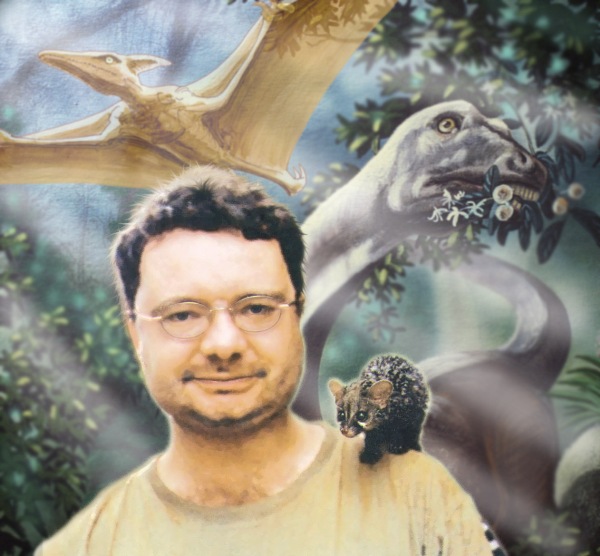
Bill Rebsamen’s tribute to Scott Norman, who passed away suddenly earlier in 2008.
This may be a difficult essay for you to read, but this is a subject we all have ignored for a long time. There is a darker side that occurs after the obituaries and remembrances are written. What happens after the tributes are published? Why have we avoided the obvious, and watched legacies vanish? There are some things I’ve got to say.
We shall pick up an existence by its frogs.
Wise men have tried other ways. They have tried to understand our state of being, by grasping at its stars, or its arts, or its economics. But, if there is an underlying oneness of all things, it does not matter where we begin, whether with stars, or laws of supply and demand, or frogs, or Napoleon Bonaparte. One measures a circle, beginning anywhere. ~ Charles Fort, Lo!
Remembering
For several years now, I’ve recognized the importance of celebrating the lives of cryptozoologists who have passed away.
Unremembered, unembraced, uncelebrated. I feel that is no fate for cryptozoologists who have toiled so hard in the fields of the hidden for so long. I figure while others wish to understand the world through the deaths of kings, movie stars, artists, and media spokespeople, I will know an existence by its cryptozoologists, those who have searched in the natural world for the unknown species on the edge of discovery.
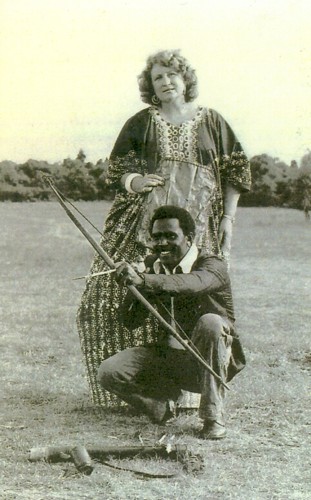
Jacqueline Roumeguere-Eberhardt, standing.
To me, if no one writes remembrances for some of these great people, who will? Indeed, I feel directly responsible for getting the wider recognition for the good works of people like Bernard Heuvelmans, Rene Dahinden, Grover Krantz, Jordi Magraner, Scott Norman, Archie Buckley, Jacques Boisvert, Jacqueline Roumeguere-Eberhardt, Mark Bayless, and others now known to a wider public through spinoff obituaries carried via The Times of London, National Public Radio, The New York Times, and other media outlets.
In no way am I saying this to be applauded personally, as I wish many more would do as I have, and write their own celebrations of cryptozoologists’ lives and obituaries. This should be especially done, if you worked closely with a cryptozoologist who has died. Indeed, sending on yours, my or others’ obituaries to the mainstream media, oftentimes, is important, as these women and men need to be discussed, to serve as models for future generations.
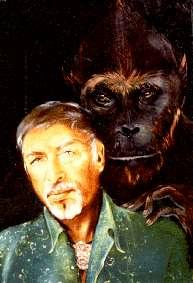
Bernard Heuvelmans and a friend by Alika Lindbergh.
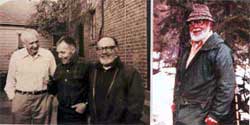
Others who have passed this way: L to R ~ George Haas, Rene Dahinden, and Archie Buckley – and on the right, Archie Buckley alone; group photo taken by Loren Coleman, at Haas’ Oakland home, 1975.
Unknown, Unheralded
The wide-ranging labor of a cryptozoologist sometimes goes unheralded, unfortunately, until the person dies. That’s the reality of life – and death. It should not be so, and I think we all should do our part to make certain those that pass before us are recalled. We stand on their broad shoulders.
Bernard Heuvelmans, before he died, worried he would not be remembered for his groundbreaking studies in the field of cryptozoology. He should not have feared so, for his contributions are many. Likewise, those taken from us so soon and so early, such as Mark Bayless and Scott Norman, in their 40s, gave much in their short lives to our field and deserve full honors, I feel.
But who knows about them if we don’t acknowledge them? Don’t write about them? Don’t pass on their legacies to the young and the old?
The Death Markup
Now, comes the dark side of death, however, and I must speak of it. I have been keeping quiet for too long, and need to address what happens when cryptozoologists die, beyond their obituaries, remembrances, and memorials.
One of the immediate things that takes place is what I call the “death markup.” Items linked to the dead cryptozoologists experience a price increase for a little while. Australian Yowie author Paul Cropper sent me word that after Tasmanian Tiger researcher Eric Guiler recently died, an online bookseller sent an ad to him for the sale of Guiler’s Thylacine book for $477. I did a little research myself and found two copies of Guiler’s book have just been placed on sale for well over $300 US and nearly $500 US.
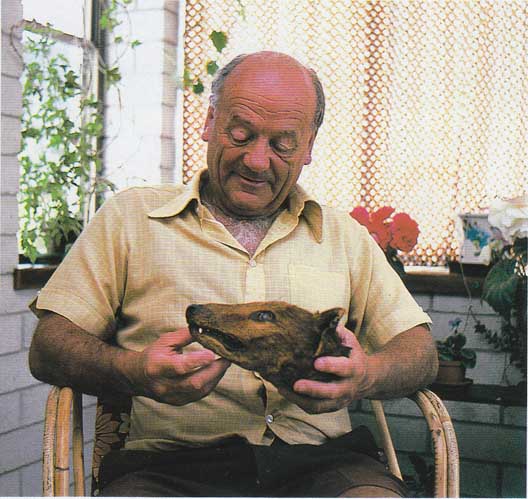
Eric Guiler holds his own personal taxidermy artifact (above), an actual Thylacine head, symbolic of his long search (below). Where is the head now?
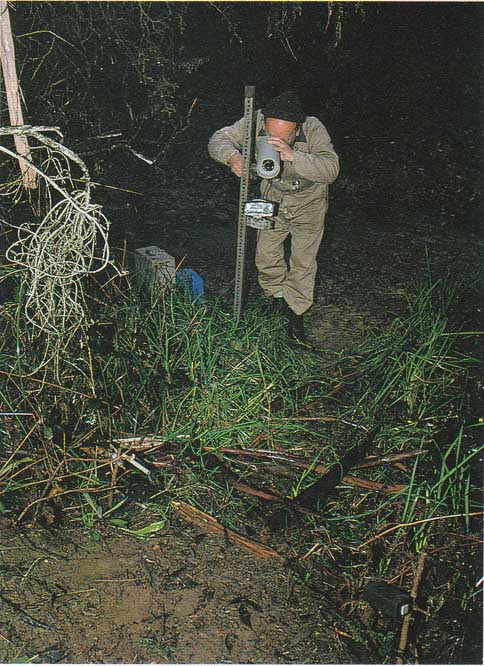
Most cryptozoologists I know are collectors – of files, of evidence, of their own notes, of books, of relics, of souvenirs of their travels, of cryptia replica, of equipment in the quest, and of physical remembrances of their expeditions and treks in search of cryptids.
What becomes of all of this “stuff” and how can we ask about and request people preserve these collections, for history? These are not easy questions.
More Tales From The Dark Side
Ask yourself, what happens to these materials, even the minor ones, after these folks die? Do you have a will? Have you told people near you what to do with your collection?
With some planning, a few worthy archives and more go safely into locations where others can access them. Then, the files, books, and collections become resources for future study and research.
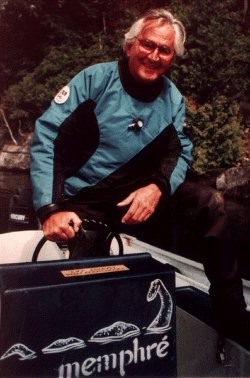
Why aren’t people routinely asking questions, such as where are (the above-pictured) “Father of Dracontology” Jacques Boisvert’s papers? What notes on human vs Sasquatch foot morphology did Archie Buckley leave behind that might be instructive to read? Why can’t someone find a copy of the episode of “Wild Kingdom” on which Marlin Perkins discusses Yeti?
We know the answers to only a few locations of such archival materials.
Ivan T. Sanderson’s papers are with the American Philosophical Society. George Agogino’s and Carleton Coon’s papers are accessible at various universities.
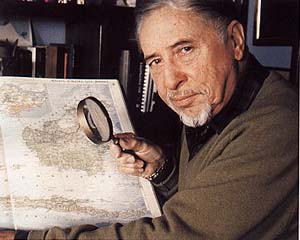
Bernard Heuvelmans’ archives went to Switzerland’s Museum of Zoology of Lausanne, and there is a dedicated room set aside for researchers.
From there, things get spotty.
Do you know where Tom Slick’s cryptozoology papers are? Has anyone preserved the records of the first and second Slick-Johnson Snowman expeditions? How about the Pacific Northwest Sasquatch Expedition sponsored by Slick?
Or even where does one go to find, specifically, archives of Grover Krantz’s Sasquatch papers?
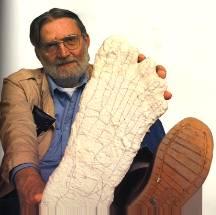
It seems Grover Krantz’s Sasquatch archives went to others, but apparently not to any one location. It is well-known, for example, that Krantz’s own skeleton and that of his dogs are in the Smithsonian and his anthropology works are with academic sites. Most of Grover’s Sasquatch casts, luckily, are now in the Jeff Meldrum collection. But Grover’s books from his library (so noted because of the inscriptions inside) began showing up on eBay, soon after his death. Where are Grover’s notes on his Sasquatch studies?
I have been told shocking stories of collections not being seen for how important they are. And disappearing. You probably know of accounts you have heard about or could share yourself. There’s nothing unique to these scenarios, but it is often unspoken and horrific as to what happens to these materials.
Many of us, of course, who have our own collections and museums, are careful to be respectful and watch, with upset, as certain situations unfold. Yet it is a difficult position in which to be placed. We have to guard against being seen as “vultures,” ourselves, for suggesting that items be kept together, and remain open to other researchers through being donated to the few of us who are willing to preserve the history of cryptozoology. Yet, how does one steer the correct route through such sensitive matters?
We must stop beating around the bush. I have in my memory a remarkably heart-breaking example of the horror of seeing a collection lost. Someday I will write more of that. But I won’t today. I can’t yet.
In the meantime, I hope I have opened a new door leading to a bit of self-examination within the field of cryptozoology, and for the saving of our history. Tell me your examples, share your stories, and I’ll record the awful tale I have nightmares about for you on another day.
^^^^^^^^^^^^^^^^^^^^^^^^^^^^^^^^^^^^^^^^^^^^^^^^^^^^
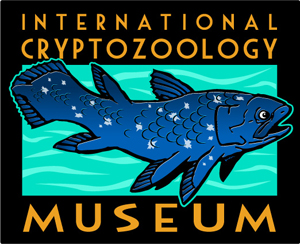
International Cryptozoology Museum
c/o Loren Coleman, Director
PO Box 360
Portland, ME 04112
USA
About Loren Coleman
Loren Coleman is one of the world’s leading cryptozoologists, some say “the” leading living cryptozoologist. Certainly, he is acknowledged as the current living American researcher and writer who has most popularized cryptozoology in the late 20th and early 21st centuries.
Starting his fieldwork and investigations in 1960, after traveling and trekking extensively in pursuit of cryptozoological mysteries, Coleman began writing to share his experiences in 1969. An honorary member of Ivan T. Sanderson’s Society for the Investigation of the Unexplained in the 1970s, Coleman has been bestowed with similar honorary memberships of the North Idaho College Cryptozoology Club in 1983, and in subsequent years, that of the British Columbia Scientific Cryptozoology Club, CryptoSafari International, and other international organizations. He was also a Life Member and Benefactor of the International Society of Cryptozoology (now-defunct).
Loren Coleman’s daily blog, as a member of the Cryptomundo Team, served as an ongoing avenue of communication for the ever-growing body of cryptozoo news from 2005 through 2013. He returned as an infrequent contributor beginning Halloween week of 2015.
Coleman is the founder in 2003, and current director of the International Cryptozoology Museum in Portland, Maine.






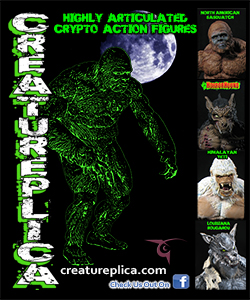
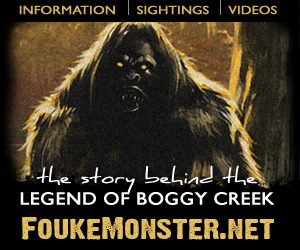
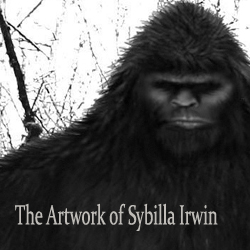

It really saddens me to see that so many priceless collections are either auctioned off, or just discarded and forgotten. You’re right Loren, people need to stop ignoring this, and all these amazing people should NEVER be forgotten.
I agree, it’s not pretty how some one of a kind specimens end up on ebay. On a similar note, I remember being quite horrified to hear the largest specimen of fulgurite (AKA “petrified lightning”) was sold off ebay to some millionare who wished to hash it up and make it into a fancy gravestone. I think ebay is the place for garbage like gum chewed up by baseball players and giant hunks o’ cereal, not important scientific data. Trouble is, money talks.
Great article.
It is really sad to see so many of the legends aging and passing on, especially if their legacy and contributions are ignored or gobbled up by some greedy person with no real interest in the field. I think, even people like myself who have nowhere near the amount of items that some of the famous have, should at least make sure that they pass on their artifacts and research to someone who has the same love of cryptozoology as they do.
It really breaks my heart that only two of the “four horseman of Sasquatchery” are still alive and both are not in the best of health and not really active in cryptozoology anymore, Green and Byrne. These men inspired an entire generation of youth like myself (who grew up in the 60s and 70s) and are responsible for giving this field some much needed credibility. I hope some of those in the limelight today will take notice of these men who did their work out of love and natural curiousity, not out of greed or a moneymaking scheme.
It really saddens me to see the thing that we love being totally made mockery of by all the obvious fakes and greedy so called “researchers.”
Yes, I do think that everyone who has some items, articles and such should really make sure that it goes to someone who will really appreciate it and not just a family member with no interest, or worse, some greedy ebay scam artist. The field will suffer if this happens.
Great article that addresses something that needed to be addressed.
We all need to make sure that the contributions of people in this field do not go unnoticed or underappreciated. Peace.
Touchy subjects, death, and the loss of career efforts and data. Congratulations on bringing the matter into the light for sensitive discussion.
What of these Cryptozoologists – aging and neophyte – how can we inspire them to transcribe and record and collect and protect their work, and to make sure that every piece is transferred to a proper repository en mass, so that future researchers can follow and understand and evaluate the historical continuity of their efforts?
And what is the proper storehouse for this material, a place where they can be protected and yet available for relevant display and careful analysis by serious searchers – the Smithsonian? Loren’s “International Cryptozoology Museum”? University Libraries? Which University? Which country? How many locations?
And who controls it all? Where does the money come from? Is it ALL available on the Internet (after all, that’s how the Internet started, as an academic interconnection), or just the File and Object listings and photos?
And how do we communicate the critical importance of this painful subject to Cryptozoologists – and Paranormal Researchers of any ilk – as yet unborn, with respectful sincerity and willing assistance?
And what of Loren’s own amassed history – what plans have been made for preservation of the Museum, and all the files, and the statue, and the photos, and the videos, and the lectures and — everything?
Let’s talk it over.
When my grand-uncle Daniel passed away, and his brother Julian a few years later, my mother told me that if I wanted to keep some of their books that I should go their little one-storey house located near downtown and pick out whatever I wanted. But I was told I had to be quick about it because they were going to throw everything away since my mom and her sisters wanted to sell the house.
I remember going to the home of my Abuelos, who helped her sister —my grandmother raised— who raised her two daughters after her husband left them. They all lived together, you see, and somehow I had a deep connection with those two men, since I’m very much like them—Abuelo Daniel was a very wise man that never went to school and yet amassed a great deal of knowledge from all the books he read; he even had a few books dealing with Fortean topics that I used to read whenever I visited them, so I guess he’s the one of the reasons I’m writing these lines right now. Abuelo Julian was a very jovial man that loved to see movies and be around his family. Both of them never married, as I feel will be my fate too.
So, did I go to pick through the books of my Abuelos? I’m ashamed to confess I let time pass and didn’t go. Maybe I was afraid to go to that house full of memories, all by myself. The house where both men died. Alone.
My mom did salvage a few books though, and gave them to me. The books are cheap crumpy softcover editions and the pages are falling off, worthless. But I wouldn’t give them away for the world now.
A tragic tale of dead cryptozoologist’s books not seen for their signigficance happened at my local library:
For many years they owned a copy of The Loch Ness Monster and Others (R. T. Gould, 1934), one of the first works on freshwater cryptids. This was when Bernard Heuvelmans was in grade school. And, because no one checked it out, the library considered it worthless and threw it away. The same year I discovered their rare treasure and went to check it out.
Sad, isn’t it?
Thank you Loren for this very important commentary.
This very issue is part of the reason I founded the non-profit ANOMALY ARCHIVES that I operate here in Austin, Texas.
We’ve received several collections from various Anomalists, Forteans, Parapsychologists and UFOlogists. None of these has been from an “estate” of someone who has passed on. These are all from folks who have either lost interest, no longer have space to accomodate the materials or simply wanted to share these resources and treasures with a wider audience.
This is one of the reasons why I so strongly support your efforts with the ICM.
– SMiles
Very great article, Loren.
Ultimately, our “ultra-empirical” society does not care to recognize people who make it their life’s work to seek and study beings and animals that fall outside that said society’s specific viewpoint and majority paradigm. And that is very sad.
A non-profit ANOMALY ARCHIVE in Austin, Texas? Who knew?
Where are other Organizations which might offer sanctuary and protection for these priceless items when their creators are no longer able to care for them?
It’s a tough job, and who’s gonna do it?
I am not sure if Loren is implying having a will, but I really wish some of those who passed away did. I am sure they had a will on their financial matters.
No one wants this information or research to die, so it would be great if it could be donated to a museum (like Loren’s) if a family member or associate is not willing to take this on
For the record, books being dumped does not only effect cryptozoology, but other areas. A friend of mine was moving to the another part of the proving a year after the death of his father, who was a prominent and well respected economist. The friend, living with mother, was taking her with. I was horrified when seeing a dumpster at the front of the house which had books and journals. I told him some of these were old and out of print books. He claimed none of the local libraries were willing to take them.
In response to where are the organizations to look after these things, well there is the Charles Fort Institute; they managed to get the library of ufology author Raymond W. Drake just before it was thrown out! Naturally Loren and his museum could give collections a good home as well.
Gordon
I remember some 25 years ago when we were called in to a dreary apartment to view the books belonging to a major science fiction editor. He’d left no heirs, and his landlord was eager to clean the place out and get a new tenant. He said with some satisfaction that it had taken quite a bit of work, but he’d finally filled the dumpster with all the files and correspondence and had it hauled out. We didn’t have the heart to tell him that the files and correspondence would probably have been worth more than the building.
It’s always tough trying to figure out when and how to broach the subject of what is happening with someone’s books, correspondence, and artifacts. Dealing with death and your own grieving is hard; many times dealing with relatives is harder.
First line of defense is to make sure the cryptozoology community is well aware of what each cryptozoologist should do. Maybe even make a significant date to bring up the subject each year, perhaps a death date of a famous cryptozoologist (check that it is at a time where people aren’t busy with other holidays. Be prepared to find that some people really don’t deal with talking about death well. Having to discuss this sort of thing may be taboo for them. If you know the relatives, asking well before there is any need might be a good strategy.
Have dispersal of your research files written into your will, or at very least in a signed and dated document with your important papers. If you study a number of different fields, you may want to put contact information for the person or institution who is getting the information right with the files themselves.
Few people seem to have considered their online assets. If you have a website or a forum, give someone you trust access to it if needed. The email accounts of the deceased will not be kept up, and credit cards on file for automatic renewal of domain names, will be stopped. If they can show that they are the executor, they may be allowed access to it. You’ll need to give them the password and username for domains and forum administrator access, so they can change the account over to themselves. You may need to give them the password and username for domain management accounts as well. Whoever is taking care of this may want to immediately copy the entire website in case they need to mirror it elsewhere.
Give some thought to saving forum archives. There are a lot of people who write long, meticulously documented forum posts that are useful to the community, that haven’t been saved elsewhere. Sometimes it is just bearing witness to the evolution of a community, sometimes forum archives hold keys and evidence to possible crimes. Think about who online needs to be informed of your death — both individuals and discussion board communities.
Those getting the news of a sudden death online should make sure their BS detectors are well-calibrated. There have been a lot of death and sympathy hoaxes online, and aside from being quite manipulative it can really hurt the people who believed in it in good faith. If you are suspicious, politely asking for the information about the funeral home where you can send flowers can sometimes be the most tactful way.
Loren,
Thanks for a good take on a difficult subject. Carol, thanks for mentioning the online aspects. I have two modest collections that might be of use to someone, zoology/cryptozoology and space history, and will be bringing my postmortem instructions up to date. My spouse thinks it morbid, but Mark and Scott were younger than I, so you never know.